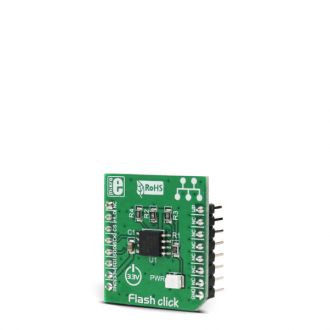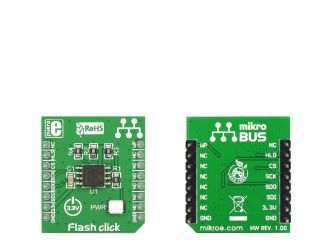
We strongly encourage users to use Package manager for sharing their code on Libstock website, because it boosts your efficiency and leaves the end user with no room for error. [more info]

Rating:
Author: MIKROE
Last Updated: 2018-06-01
Package Version: 1.0.0.1
mikroSDK Library: 1.0.0.0
Category: FLASH
Downloaded: 11323 times
Followed by: 2 users
License: MIT license
The Flash memory module used on this Click board is the EN25Q80B, an 8 Mbit serial Flash memory with 4 KB Uniform Sector, from EON Silicon Solutions. The Flash memory density is usually expressed in bits, so exactly 8,388,608 bits are organized in units (or words, also known as bytes) of 8 bits, which gives 1,048,576 bytes of data memory.
Do you want to subscribe in order to receive notifications regarding "Flash click" changes.
Do you want to unsubscribe in order to stop receiving notifications regarding "Flash click" changes.
Do you want to report abuse regarding "Flash click".


Key functions:
Examples Description
The application is composed of three sections:
void applicationTask()
{
flash_SectorErase(0x015015);
mikrobus_logWrite("Writing MikroE to Flash memory, from address 0x015015:"
,_LOG_LINE);
flash_WriteArray (0x015015, &wrData[0], 9);
mikrobus_logWrite("Reading 9 bytes of Flash memory, from address 0x015015:"
,_LOG_LINE);
flash_ReadArray (0x015015,&rdData[0],9);
mikrobus_logWrite("Data read: ",_LOG_TEXT);
mikrobus_logWrite(rdData,_LOG_LINE);
Delay_ms(1000);
}
Other mikroE Libraries used in the example:
Additional notes and information Depending on the development board you are using, you may need USB UART click, USB UART 2 click or RS232 click to connect to your PC, for development systems with no UART to USB interface available on the board. The terminal available in all MikroElektronika compilers, or any other terminal application of your choice, can be used to read the message.